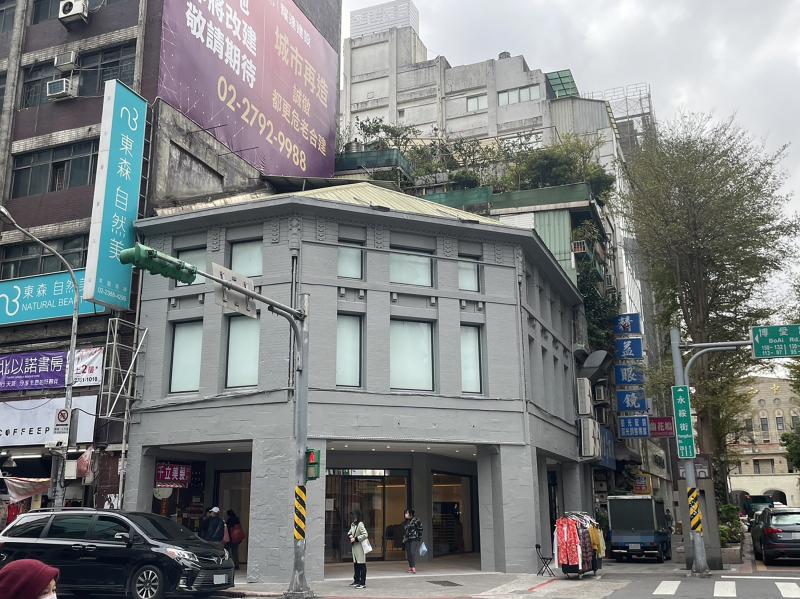The owner of an historic property on Taipei’s Boai Road is to be fined after they continued with renovations despite the building being flagged for review as a cultural heritage site.
The property, which is located at 132 Boai Road in Taipei’s Zhongzheng District, was built in the 1920s during the Japanese colonial era. The building was surveyed by the city’s Department of Cultural Affairs in August last year, at which time it flagged the property for further review to determine its status as a cultural heritage site. Bureau officials then visited the property in December last year and February this year as part of the review process, the department said.

Photo: CNA
Properties flagged for review are granted temporary historic status, during which time owners are not permitted to dismantle or remove any part of the property’s structure, and are required to maintain and preserve the property, the department said.
However, despite the injunction the owner of the building at 132 Boai Road renovated the building and converted it into a reception area for presale housing properties, it said, adding that part of the renovations involved removing the building’s original wooden roof and replacing it with metal sheets. The department said a fine of NT$500,000 would be imposed on the contractor, and a fine of NT$300,000 imposed on the property owner.
During a meeting with department officials on Monday, the owner justified the renovation work saying that it was necessary as termites had infested the wood, which caused leaking and made the building dangerous.
The owner said that work had already begun before the injunction was imposed, and said he had suffered financial losses due to fines imposed on the contractor, and the loss of rent when the tenant was forced to vacate the property. Department officials said the fines were imposed because the owner continued renovation work after the injunction.
Separately, the contractor, Shuang Zheng Li Construction Co. (双正利建設), said that it continued work after the injunction was imposed as it was “unfamiliar with the Cultural Heritage Preservation Act (文化資產保存法).”
The bureau said it would urge the owner to restore the wall paint to its original state and rectify the water leakage. In the future, it would continue to work with the owner on drafting restoration, reuse and management plans for the property, and provide relevant subsidies and resources, it said.

‘DENIAL DEFENSE’: The US would increase its military presence with uncrewed ships, and submarines, while boosting defense in the Indo-Pacific, a Pete Hegseth memo said The US is reorienting its military strategy to focus primarily on deterring a potential Chinese invasion of Taiwan, a memo signed by US Secretary of Defense Pete Hegseth showed. The memo also called on Taiwan to increase its defense spending. The document, known as the “Interim National Defense Strategic Guidance,” was distributed this month and detailed the national defense plans of US President Donald Trump’s administration, an article in the Washington Post said on Saturday. It outlines how the US can prepare for a potential war with China and defend itself from threats in the “near abroad,” including Greenland and the Panama

A wild live dugong was found in Taiwan for the first time in 88 years, after it was accidentally caught by a fisher’s net on Tuesday in Yilan County’s Fenniaolin (粉鳥林). This is the first sighting of the species in Taiwan since 1937, having already been considered “extinct” in the country and considered as “vulnerable” by the International Union for Conservation of Nature. A fisher surnamed Chen (陳) went to Fenniaolin to collect the fish in his netting, but instead caught a 3m long, 500kg dugong. The fisher released the animal back into the wild, not realizing it was an endangered species at

The High Prosecutors’ Office yesterday withdrew an appeal against the acquittal of a former bank manager 22 years after his death, marking Taiwan’s first instance of prosecutors rendering posthumous justice to a wrongfully convicted defendant. Chu Ching-en (諸慶恩) — formerly a manager at the Taipei branch of BNP Paribas — was in 1999 accused by Weng Mao-chung (翁茂鍾), then-president of Chia Her Industrial Co, of forging a request for a fixed deposit of US$10 million by I-Hwa Industrial Co, a subsidiary of Chia Her, which was used as collateral. Chu was ruled not guilty in the first trial, but was found guilty

DEADLOCK: As the commission is unable to forum a quorum to review license renewal applications, the channel operators are not at fault and can air past their license date The National Communications Commission (NCC) yesterday said that the Public Television Service (PTS) and 36 other television and radio broadcasters could continue airing, despite the commission’s inability to meet a quorum to review their license renewal applications. The licenses of PTS and the other channels are set to expire between this month and June. The National Communications Commission Organization Act (國家通訊傳播委員會組織法) stipulates that the commission must meet the mandated quorum of four to hold a valid meeting. The seven-member commission currently has only three commissioners. “We have informed the channel operators of the progress we have made in reviewing their license renewal applications, and